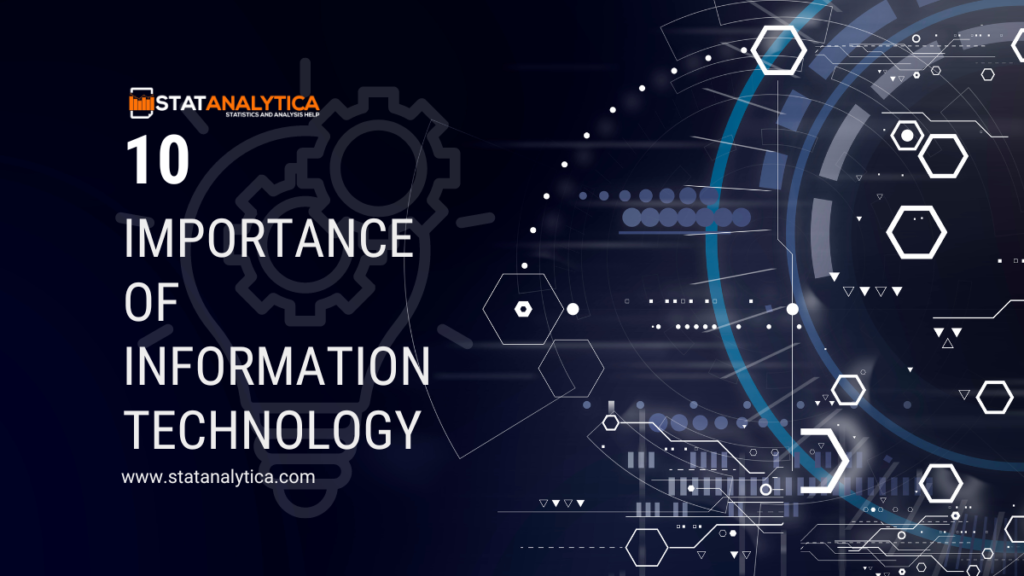In today’s world, where digital devices are an integral part of our daily routine, the significance of Information Technology (IT) cannot be overstated. From communication to education, healthcare to business, IT plays a pivotal role in shaping our lives and society as a whole. In this blog, we’ll explore the 10 importance of information technology and how it impacts various aspects of our lives.
What is Information Technology?
Table of Contents
Information Technology (IT) involves employing computers, software, networks, and various other technologies to handle and manipulate data, enable communication, and address challenges. It encompasses a diverse array of tasks, encompassing computer programming, data administration, network management, cybersecurity, and beyond.
Essentially, IT involves the application of technology to store, retrieve, transmit, and manipulate information in various forms, contributing to the efficiency, productivity, and innovation of individuals, organizations, and societies.
Is Technology Important In Our Lives?
Undoubtedly, technology plays an indispensable role in our lives, permeating nearly every aspect of modern existence.
Statistics underscore its importance: as of 2020, over 4.66 billion people worldwide were active internet users, representing nearly 60% of the global population. Moreover, the proliferation of smartphones has revolutionized communication and access to information, with approximately 3.5 billion smartphone users worldwide.
Beyond communication, technology has transformed education, with e-learning platforms experiencing a surge in popularity, especially amidst the COVID-19 pandemic, where over 1.2 billion children worldwide were affected by school closures.
In healthcare, technological advancements have enhanced patient care and accessibility, with telemedicine appointments increasing by over 150% during the pandemic.
Additionally, businesses increasingly rely on technology for operations, with 85% of companies reporting that they have accelerated digital transformation initiatives due to the pandemic.
From automation to innovation, technology has become an indispensable tool for navigating the complexities of the modern world, shaping our lives in profound and transformative ways.
What Are The Types of Information Technology?
Information Technology (IT) encompasses various types of technologies used to manage, process, and transmit information. Here are some common types of Information Technology:
- Hardware Technology: This includes physical devices such as computers, servers, routers, switches, and storage devices. Hardware technology forms the foundation for IT infrastructure.
- Software Technology: Software encompasses programs, applications, and operating systems that empower individuals to execute particular functions on hardware devices. Examples include word processing software, spreadsheet software, and database management systems.
- Networking Technology: Networking technology involves the communication and exchange of data between computers and other devices over networks. This includes technologies like Ethernet, Wi-Fi, and protocols such as TCP/IP.
- Internet Technology: Internet technology encompasses technologies and protocols used to connect devices and networks to the internet. This includes web browsers, email clients, and internet protocols like HTTP and SMTP.
- Cybersecurity Technology: Cybersecurity technology is geared towards safeguarding computer systems, networks, and data against unauthorized access, as well as various cyber threats and attacks. This encompasses a range of technologies like firewalls, antivirus programs, encryption methods, and systems for detecting intrusions.
- Database Technology: Database technology involves the management and organization of large volumes of data. This includes relational database management systems (RDBMS) like MySQL and Oracle, as well as NoSQL databases like MongoDB and Cassandra.
- Cloud Computing Technology: Cloud computing technology enables individuals and organizations to utilize computing resources and services via the internet, paying only for what they use. This encompasses offerings such as infrastructure as a service (IaaS), platform as a service (PaaS), and software as a service (SaaS).
- Artificial Intelligence (AI) and Machine Learning Technology: AI and machine learning technology entail creating algorithms and models that empower computers to execute tasks usually associated with human intelligence. This includes technologies like natural language processing, image recognition, and predictive analytics.
- Virtualization Technology: Virtualization technology allows multiple virtual instances of operating systems, servers, or networks to run on a single physical hardware platform. This includes technologies like hypervisors, virtual machines, and containerization.
- Mobile Technology: Mobile technology involves the development of applications and services for mobile devices such as smartphones and tablets. This includes mobile operating systems like iOS and Android, as well as mobile apps for various purposes such as communication, productivity, and entertainment.
These are just a few examples of the types of Information Technology that play crucial roles in modern computing and communication environments.
The field of IT is vast and continually evolving, with new technologies emerging to address changing needs and challenges.
10 Importance Of Information Technology
- Communication
- Example: Email, instant messaging apps (e.g., WhatsApp, Telegram), video conferencing tools (e.g., Zoom, Microsoft Teams) facilitate real-time communication regardless of geographical boundaries.
- Education
- Example: E-learning platforms (e.g., Coursera, Khan Academy) provide access to educational resources and courses, enabling lifelong learning and skill development.
- Business Operations
- Example: Enterprise Resource Planning (ERP) systems (e.g., SAP, Oracle) streamline business processes like inventory management, supply chain, and finance, enhancing efficiency and productivity.
- Healthcare Management
- Example: Electronic Health Records (EHR) systems digitize patient records, improving accuracy, accessibility, and coordination of healthcare services.
- Automation
- Example: Robotic Process Automation (RPA) automates repetitive tasks like data entry and invoice processing, reducing human error and increasing operational efficiency.
- Data Analysis and Decision Making
- Example: Business Intelligence (BI) tools (e.g., Tableau, Power BI) analyze large datasets to derive insights, aiding informed decision-making and strategic planning.
- Cybersecurity:
- Example: Firewall software protects networks from unauthorized access and cyber threats, ensuring data confidentiality and system integrity.
- Entertainment:
- Example: Streaming platforms (e.g., Netflix, Spotify) deliver a vast array of movies, TV shows, music, and games, offering on-demand entertainment anytime, anywhere.
- Transportation and Logistics:
- Example: GPS technology and route optimization software (e.g., Google Maps, Waze) facilitate efficient navigation, reducing travel time and fuel consumption.
- Environmental Sustainability
- Example: Smart grid technology optimizes energy distribution and consumption, promoting renewable energy integration and reducing carbon emissions.
In essence, Information Technology permeates various aspects of our lives, driving innovation, efficiency, and connectivity across different sectors and industries.
What Are The Biggest IT Challenges?
The field of Information Technology (IT) faces numerous challenges, reflecting the complexity and rapid evolution of technology. Some of the biggest IT challenges include:
- Cybersecurity Threats: Cybersecurity remains a significant challenge, with hackers constantly developing new techniques to exploit vulnerabilities in systems and networks. Cyber attacks such as malware, ransomware, phishing, and DDoS attacks pose serious threats to organizations and individuals alike.
- Data Privacy Concerns: With the proliferation of data collection and storage, protecting personal and sensitive information from unauthorized access and misuse has become a major concern. Adhering to laws like the General Data Protection Regulation (GDPR) and the California Consumer Privacy Act
(CCPA) adds further obstacles for businesses.
- Cloud Integration and Management: While cloud computing offers numerous benefits, including scalability and cost-effectiveness, effectively integrating and managing cloud services and infrastructure presents challenges related to data migration, interoperability, security, and compliance.
- Legacy System Modernization: Many organizations still rely on outdated legacy systems that are expensive to maintain, difficult to integrate with modern technologies, and lack scalability and flexibility. Modernizing legacy systems while minimizing disruption and ensuring compatibility with new technologies is a significant challenge.
- Skills Shortage and Talent Acquisition: The need for proficient IT professionals is on the rise, particularly in fields like cybersecurity, cloud computing, data analysis, and artificial intelligence. However, there is a shortage of qualified candidates, leading to fierce competition for talent and difficulty in recruiting and retaining skilled employees.
- Complexity of IT Infrastructure: As IT environments become increasingly complex, managing and maintaining diverse infrastructure components such as networks, servers, storage systems, and applications becomes more challenging. Ensuring reliability, performance, and security across complex IT ecosystems requires advanced management tools and strategies.
- Regulatory Compliance: Compliance with regulations and standards in areas such as data security, privacy, and industry-specific requirements (e.g., healthcare, finance) presents ongoing challenges for organizations. Keeping up with evolving regulations and ensuring compliance can be time-consuming and resource-intensive.
- Digital Transformation: The process of digital transformation involves leveraging technology to innovate, optimize processes, and enhance customer experiences. However, navigating the complexities of digital transformation, including cultural resistance, organizational inertia, and resource constraints, poses challenges for many organizations.
- IT Budget Constraints: IT budgets are often limited, requiring organizations to prioritize investments and allocate resources strategically. Balancing the need for innovation and technology adoption with cost constraints can be challenging, particularly for small and medium-sized businesses.
- Emerging Technologies and Trends: Staying up-to-date with swiftly advancing technologies like artificial intelligence, machine learning, blockchain, and the Internet of Things (IoT) poses difficulties for IT experts. Grasping the potential effects of new technologies and pinpointing chances for integration, all while minimizing risks, demands ongoing education and adjustment.
Overall, addressing these challenges requires collaboration, innovation, and a proactive approach to managing technology risks and opportunities in an increasingly digital world.
Conclusion
In conclusion of 10 importance of information technology, Information Technology is not just a tool; it’s a transformative force that shapes our lives and society in profound ways. From communication to education, healthcare to business, the importance of IT cannot be overstated. As we continue to embrace digital technologies and harness their potential, the possibilities for innovation and progress are endless. Let’s embrace the power of IT and build a brighter, more connected future for all.


